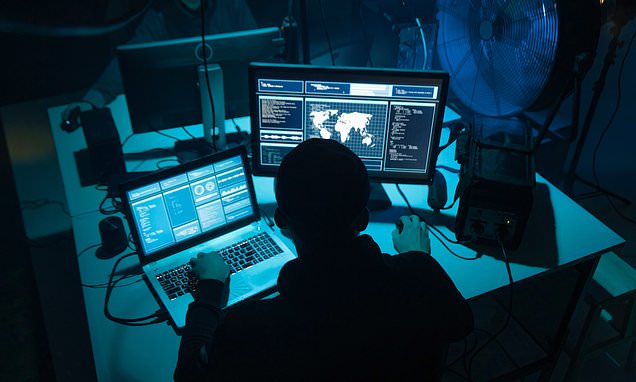
Revealed: The top-secret UK cyber force waging a daily battle with hostile states including Russia and Iran comes out of the shadows for the first time
- National Cyber Force reveals tactics to thwart enemy states and criminals
- Established in 2020 to combat variety of threats to UK and prevent terrorism
A top-secret army of cyber hackers waging a daily battle against hostile states such as Russia and Iran to protect Britain comes out of the shadows for the first time today.
Britain’s National Cyber Force (NCF) is now revealing some of its clandestine tactics to thwart enemy states, criminals and terrorists.
The unit was established in 2020 to combat a variety of threats to the UK, support military operations and prevent major crimes such as terrorism and child sexual exploitation. Until now its operations have been shrouded in secrecy.
James Babbage, the commander of the unit which is made up of hundreds of cyber experts and spies from GCHQ, the Ministry of Defence and MI6, is publicly identified for the first time in a document setting out its operations.
The high-ranking spy, who has worked at GCHQ for nearly 30 years, leads a large team working to infiltrate digital communications of hostile states, meddling in their systems to ‘sow distrust’ in a bid to make enemies doubt their own data and decision-making.
Britain’s National Cyber Force (NCF) is now revealing some of its clandestine tactics to thwart enemy states, criminals and terrorists (file image)
Other ‘levers of power’ include paralysing enemy technology to prevent key individuals contacting each other at critical times – or fiddling with functioning of IT networks ‘making it harder for states to use the internet to spread disinformation by affecting their perception of the operating environment’.
The document summarising the NCF’s work claims its targeted lightning strikes have an effect on an ‘adversary’s understanding, capability and willpower to change its behaviour’, by decreasing morale and weakening the ability of hostile states to plan and conduct activities effectively.
It says: ‘We do this through various means including affecting an adversary’s ability to acquire, analyse and exploit the information they need to advance their objectives.
‘We may also limit their ability to communicate and co-ordinate with others. And we may seek to affect their confidence in their digital technology and the information it is providing them.’
READ MORE: Boris Johnson will set up a cyber force in the North of England to combat threats posed by China and Russia – and it will also tackle the North-South divide
Other operations include trying to win over ‘hostile actors’ or calling out their destructive activities, forcing them to abandon their plans.
The unit’s tactics can also have a direct impact on battles fought many miles away as modern armies use sophisticated digital capabilities to command forces.
The document says: ‘In military operations, where the side that most effectively uses digital systems to its own advantage, whilst reducing the ability of their enemy to do so, has a critical edge…
‘Conducting operations in cyberspace is a critical part of driving the conditions and tempo of strategic activity; a key plank of the military’s approach to increased nation-state competition, and to warfighting, where that is necessary.’
GCHQ director Sir Jeremy Fleming warned yesterday: ‘In an increasingly volatile and interconnected world, to be a truly responsible cyber power, nations must be able to contest and compete with adversaries in cyberspace.
‘In the UK, the National Cyber Force complements the UK’s world-class cyber resilience to give the country operational cyber capabilities at the scale needed to protect our free, open, and peaceful society.
‘Building upon two decades of experience, the dynamic new partnership has countered state threats, made key contributions to military operations, and disrupted terrorist cells and serious criminals including child sex offenders.’
In the last three years, the NCF says it has ‘countered state disinformation campaigns’ from countries such as Russia and Iran, ‘reduced the threat of external interference in democratic elections’ and protected military deployments overseas.
It warns that the war in Ukraine has only increased the risk of cyber attack, adding: ‘The Russia-Ukraine conflict has seen cyber criminals and hacktivists explicitly aligning themselves with each side’s political objectives and carrying out cyber-attacks targeting foreign interests for political purposes.’
NCF operatives have also disrupted terrorist groups by spreading distrust among members, degrading their propaganda networks and preventing them from putting extremist media online.
The force, which is establishing a new permanent base at Samlesbury in Lancashire, is due to grow to 3,000 workers in the next few years.
Sir Jeremy has also credited its work in preventing tens of millions of pounds in fraud against the UK economy – making hundreds of thousands of stolen credit cards worthless to criminals and safeguarding countless potential victims of crime around the world.
Source: Read Full Article

